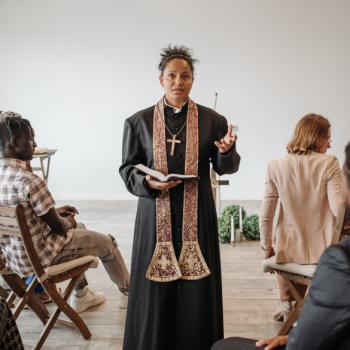
“My Redeemer Lives” is perhaps one of the most profound statements of faith in all of scripture. With those three simple words, Job transcends the brutality of his life circumstances with a sudden burst of confidence in the God that will one day set things right.
Of course, thousands of years later, those same words have taken on new meaning. In the midst of all that continues to be wrong in the world in 2022, they serve not only to express faith that God will set things right, but also to declare our knowledge that God has already begun to set things right through the life, death, and resurrection of Jesus Christ.
For the Christian, there is no truth more central to our faith than the resurrection of Jesus, our Lord and our Redeemer. And so I can think of no title more fitting for my new column about the Christian faith.
Who am I?
My name is Dayne Batten. I’m a husband, a father to three wonderful young boys, a data scientist, and a lover of the outdoors. When I’m not working or hanging out with the family, I enjoy reading and writing about theology and the Christian life.
So I’m excited to be launching this new column on Patheos and engaging with the broader community about issues that are near and dear to my heart! I currently plan to keep the column focused on three general topics, all of which are current passions of mine.
Let me lay each of them out in turn—perhaps something will pique your interest for the future!
Topic #1 – Expanding our Understanding of “Gospel”
For many Christians, especially in evangelical circles, I believe that “the gospel” has essentially been reduced to a very narrow, individualistic story. I’m a sinner, I deserve to be punished, Jesus died for me, so I can be forgiven. I should say at the outset that there’s nothing about that story that I deny. In fact, I wholeheartedly affirm every aspect of it.
However, if we reduce the gospel to nothing more than this, I believe we miss a ton of what scripture has to say. For example, you might have gathered from the start of this post that I believe the resurrection of Jesus is the central truth claim of the Christian religion. But the resurrection features exactly nowhere in “the gospel” as I just summarized it. I think that’s a problem. And I think we can learn a lot by bringing the resurrection back into our understanding of good news.
Of course, there are other avenues to explore. We often think of Jesus’ death as substitutionary (and again, I’m not here to deny that), but the New Testament constantly talks about it in participatory terms. For example, Paul says in Galatians 2:20, “I have been crucified with Christ.” Understanding what he means by this is crucial to grasping entire swaths of his gospel theology. But, at least in my experience, it’s something that’s rarely explored.
I’ll spare you further examples for the moment. But we’ll get into them soon!
Topic #2 – The Bible as a Work of Literature
I believe that the average Christian blows right past much of the meaning in scripture (especially in historical accounts) because they’re not accustomed to reading the Bible as a work of literature. And by “a work of literature,” I mean as a work of art that makes strategic use of subtext, motifs, allusions and other literary features to convey meaning that goes deeper than the basic plot.
Personally, I know that I read the Bible this way for the vast majority of my life. My mind was blown when I first had my eyes open to a lot of what was going on under the surface. And, after my perspective has shifted, I’ve never looked back.
My hope is that many of the posts on this column will help my readers connect with scripture in a new way. And there will be no need to get super academic about it. We’ll break familiar passages down in accessible ways that will shed a bunch of new light on what the authors are trying to do. Personally, I think it should be very exciting.
Topic #3 – The Bride of Christ and Sexual Ethics
About a month ago, I wrote a guest post for Patheos in which I argued that the church should look to the biblical motif of God and his people as bride and groom as its primary lens for understanding sexual and relational ethics. This idea is something I’ve been exploring significantly for the last year or so, and I’m actively considering whether to write a full-length book on the subject.
In a way, I see this topic as a practical application of the first two. The God-and-his-bride theme is one of the most expansive literary themes in all of scripture. It appears at least as early as the book of Exodus and runs right through to Revelation. And it’s a powerful metaphor for the gospel truth that God is taking a world full of victims and sinners and calling them to be members of his perfect bride, the church.
Applying this story to sexual and relational ethics is simply a way of exploring how this particular biblical theme impacts the very real challenges we face as we navigate life in a sex-soaked secular culture.
Join Me?
If any (or all) of these topics sound interesting to you, please come back soon to check out a post or two. I hope you’ll find something that’s interesting and encouraging.
And if there’s something about the above topics that you’d be particularly interested in hearing about, let me know in the comments! I’m excited about engaging with the broader Patheos community, and happy to engage with what people find interesting and helpful!
Image Credit: Frederico Respini / Unsplash
















